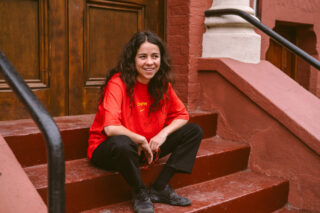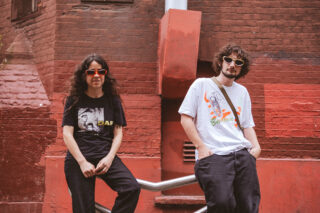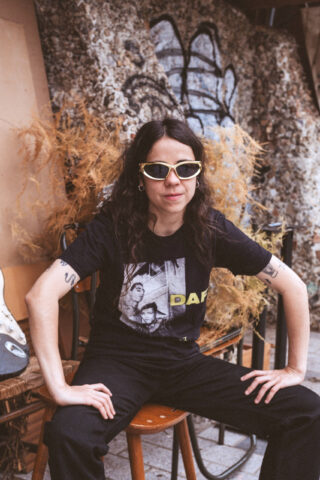Mabe Fratti: “Sometimes my dad brought home new age animal music. Like wolf sounds”
The Guatemalan cellist and experimental songwriter who unlocked her potential – and learned not to give a fuck – in Mexico City

The Guatemalan cellist and experimental songwriter who unlocked her potential – and learned not to give a fuck – in Mexico City
On a late Wednesday afternoon, the East London sun bends under Café Oto’s daytime awning through wood-framed windows and bounces off the chalk-white walls onto the bookshelf in the corner of the room. Guatemalan-born cellist and composer Mabe Fratti stands inquisitively over it, poring at the spines of essays and novels, pulling them out and placing them back on the shelf. More books are scattered across a big, circular mid-century table to her right – alongside near-novelty sunglasses and half-drunk drinks – while a smaller, more considered pile of books – Anthony Braxton’s Forces in Motion and Manon Burz-Labrande’s Unquiet Tales of Acoustic Weird – rest on the piano. Mabe’s tour manager, Max – a big Dutch man dressed like a cowboy – gently stops a café worker tidying them up as she clears the room of coffee-drinkers ready for soundcheck.
It’s the beginning of Mabe’s two-night residency in Dalston with her band, guitarist Héctor Tosta and drummer Gibrán Androide. The three of them mosey to a seat, speaking like old friends in interchangeable English and Spanish. Individually, they’re recognised players at the heart of Mexico City’s experimental scene, but it’s Mabe who’s become their overseas emissary. Her presence is immediately studious and warm. It figures, for her solo work to hold the inordinate capacity to venture deep and soar high: tracks like ‘Desde el Cielo’ and ‘Cada Músculo’ from her latest album, Se Ve Desde Aquí, revel in melody, where plaited strands of vocal and cello barely break eye-contact before shattering in a squall of brass and synth. Later this year sees the birth of two new collaborative projects: Titanic – which centres Mabe’s voice over Héctor Tosta’s compositions – and Amor Muere, where Mabe lines up with fellow Mexico City experimenters Gibrana Cervantes, Concepción Huerta and Camille Mandoki. “But we’re all here because of you,” grins Gibrán, as Mabe bashfully contests that she shouldn’t be these projects’ mouthpiece, before reluctantly grinning back.
Her journey to this point has been undulant – a cellist by design, after respiratory problems stopped her playing the saxophone. She started performing with the children’s orchestra in Guatemala, an academy attached to the Sinfónica, which advocated for the accessible learning of classical instruments. Her self-discovery can be attributed to a CD of new age wolf sounds and an evangelical church that taught her the meditative state of improvisation but thought that she had a demon trapped inside her. She emphasises, all-too-modestly, that she’s only found this measure of success by being available. She bought herself a cheap microphone, and after years of playing in local bands, a representative of the Goethe-Institut on the hunt for Guatemalan musicians stumbled across Mabe’s Soundcloud recordings and offered her a paid-for residency in Malinalco, Mexico.
 “Your map is very limited when you get into a new place, right?” she says. “You cannot travel anywhere without feeling like you’re in a giant city. I knew I needed to go to concerts and learn about this new scene that we do not have in Guatemala. It was mind-blowing to go and see. To go to [Mexico City jazz venue] Jazzorca. To go to what was known then as Terraza Monstruo – all these DIY places with this very free music.” Her arms stretch out describing the scale of these clubs and the city’s improvisational scene, where spaces refuse to sell alcohol (it’s a distraction) and nurture musicians as artists rather than employees. She smiles and puts down her glass of wine. “That’s when I started to make friends and feel at home,” she says. “I have friends in Guatemala too, of course, but they’re cooks, one is a barrister, one used to work in a zoo. But these people [in Mexico City] were involved in this movement. That’s how I met everyone from Amor Muere, for example, and then a musician who connected me with Héctor from Titanic.”
“Your map is very limited when you get into a new place, right?” she says. “You cannot travel anywhere without feeling like you’re in a giant city. I knew I needed to go to concerts and learn about this new scene that we do not have in Guatemala. It was mind-blowing to go and see. To go to [Mexico City jazz venue] Jazzorca. To go to what was known then as Terraza Monstruo – all these DIY places with this very free music.” Her arms stretch out describing the scale of these clubs and the city’s improvisational scene, where spaces refuse to sell alcohol (it’s a distraction) and nurture musicians as artists rather than employees. She smiles and puts down her glass of wine. “That’s when I started to make friends and feel at home,” she says. “I have friends in Guatemala too, of course, but they’re cooks, one is a barrister, one used to work in a zoo. But these people [in Mexico City] were involved in this movement. That’s how I met everyone from Amor Muere, for example, and then a musician who connected me with Héctor from Titanic.”
Born into a Christian family, Mabe’s parents weren’t musical but her father used to bring home CDs to inspire her. “There was either Christian music, Disney music or classical music,” she laughs. “And then he sometimes brought home new age animal music. Like, wolf sounds. That was really nice. I enjoyed those CDs with the new age and animals. And then once he brought me a Ligeti CD. He didn’t know it was a Ligeti, he just saw the cello player on the cover and thought, ‘Oh this is for Mabe!’ And then when I listened, I was like, ‘What the fuck is this!’ I was ten years old but the first movement did something to me. I had some perspective of the whole.” When she started playing with the church orchestra as a teenager, her brain was hard-wired to traditional classical music. “It was nice to hang out with musicians, but it was a neo-pentecostal church.” She inhales. “If you don’t subscribe to an ideology it’s the worst to follow the etiquette of the thing. I started playing in the middle of my teenage years when I was quite rebellious. My parents were like, ‘Oh lost child’”– she creaks an impression of a stricter voice – “and then I was sent to evangelical school. You know, they thought [Japanese trading card game] Yu-Gi-Oh! was satanic. They thought that I had a demon. The band was hilarious – very good players actually. Very good musicians. And then I guess there was no demon inside me. I was exorcised.”
She’s quick to clarify that she’s not a teenager anymore who doesn’t care what her parents think. “My mother reads the bible every night,” she smiles, “they’re human – maybe this is their reason for being alive. I really respect that monastic reading.”

Héctor (I la Católica) speaks in a slightly higher register, his voice more playful, like the words are little animals jumping around his head before they spill out. He left Venezuela during the political crisis in 2016, working as an administrator at a dining room in Argentina when his brother (“He’s a comedian, a pretty good one!”) called and offered him a spare room in Mexico City, knowing his wishes to become a musician. His debut album with Mabe as Titanic, titled Vidrio, is composed to compass her voice around the chaotic urban soundscapes of Mexico City – a hybrid jazz record inspired in equal unlikely parts by David Cronenberg’s 1983 sci-fi film Videodrome and Derek Jarman’s cottage off the coast of Dungeness.
He’s explicitly delighted to have Mabe speak for the project. “I feel like talent doesn’t always get the merit it should,” he explains, riffing against a James Baldwin quote about its insignificance. “Being talented and being creative are both amazing things. But it seems to me people are over-reliant on the creative. It can be pretty cool, you know, but I’m in a campaign of defending talent. A good singer can save a bad song. And the talent often has more mystique than the creative.” He’s quick to clarify that Mabe has both talent and creativity.
“We wanted to get the spelling in a precise way to sing the mood,” he says. “We wanted the vocals to feel a little bit naïve and prepared. You have to speak Spanish to hear it, but we found the proper pronunciation of all these words, and then cut the last syllable. Mabe has an amazing accent. She has a thing with the Rs. You know when kids don’t know how to say the R, they say ‘owrrr’ or something.” It sounds almost wolf-like. “She didn’t develop that, and she’s always afraid to say the Rs, but I’m like a hooligan!” He lets out the fondest laugh, and leaps up animated: “Tell the Rs! Tell the Rs!” Mabe doesn’t pay him any attention, but looks over and howls when he claims he wanted the drums on the record to sound like Limp Bizkit. The subject changes back to source: “If you ask me,” he smiles, “Mexico City is the New York City of Latin America.”
“I fell in love with the energy in this city,” Mabe agrees. “When I first got there, I would just go to the internet and ask people about stuff. And Julian Bonecchi who I met in the residency was just like, ‘You have to meet Camille and Gibrana’, now of Amor Muere.
“I went to play in this radio session organised by a punk station called Radio Cabra – goat radio – and then [a band called] Tajak released my first record on their label Hole Records, which is how Rich from Tin Angel found my music.”
“When we’d just started Titanic we were touring on Mabe’s second album,” chimes in Héctor, “sat in really heavy traffic with Rich. And we were like, ‘We have these demos, do you want to listen to them?’ He put them on in the van with us and then didn’t say a word for hours, it was pretty weird. I thought he didn’t like it. When we arrived at the venue, three hours had gone with him saying nothing. Then out of nowhere he was like, ‘We should record this.’ I was like, ‘The fuck is wrong with you!?’”


As the three step out on stage for their first night at Café Oto, Dalston becomes Mexico City. The humdrum of the outside drinkers, the whir of a coffee machine, the books getting knocked off the shelf, the short spectator sitting on the piano fallboard, the glass windows reflecting the lampshade onto delivery drivers queuing outside the chicken shop. The rhythms of the city – here and there – can change at any moment. On stage, the trio lock eyes, smirking at one another, making these sounds for the first time like this around Mabe’s music. At the end of the set, once the crowd disperses, Ben Howard (yeah that one) rushes up from the audience to interrogate Héctor about his pedals. A week later, on the Garden Stage at End Of The Road, Héctor improvises Reichian guitar, then from staccato uses the instrument as a vocoder, before Mabe turns ‘Creo Que Puedo Hacer Algo’ into shoegaze, voice unbound by a ceiling. The sun follows her wherever she goes, spotlighting the cello with some kind of improvisational transcendence locked in time.
Each time she plays, the songs sounds different; she treats her recordings now like they’re entries in a journal. “All of these records, when I look back at them, they’re moments in my life. The mix, my voice,” she smiles dourly, “I can think it’s all shit, so I just let them be part of my history instead. When I did my first record I learnt so much from Gibrán.” She looks over at the drummer who’s started the line-check for his solo support set of improvised drum loops. “He was my teacher in a way.” It’s a process of sound over subject, and – she repeats – not giving a fuck. “The more relaxed I feel the better outcome I get. I can do something with my naivety,” she beams. “I’m starting to grasp this about myself: I can be very naïve a lot of the time. I want to learn so much about so many things. I want to build deep into my instrument and my voice, but I believe that I can do stuff without understanding it.”